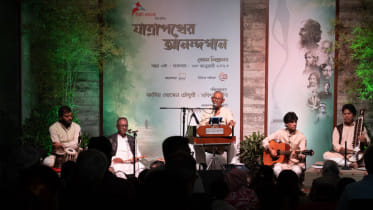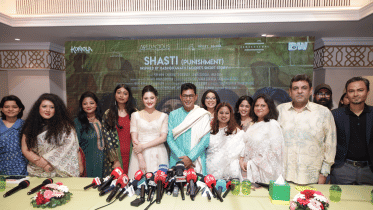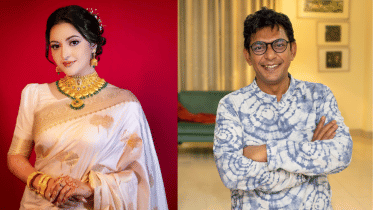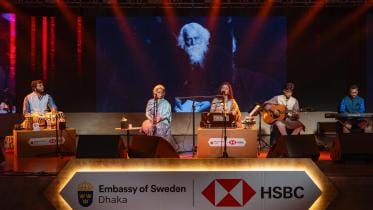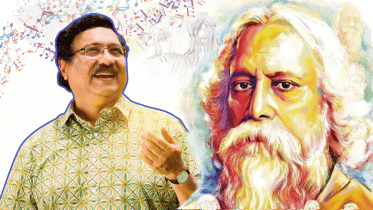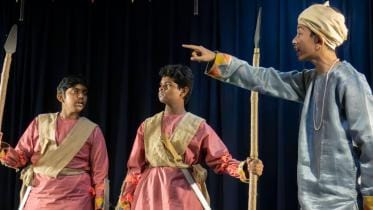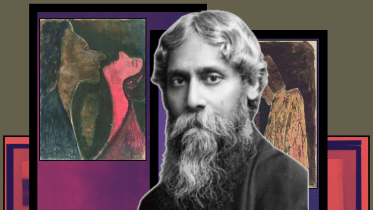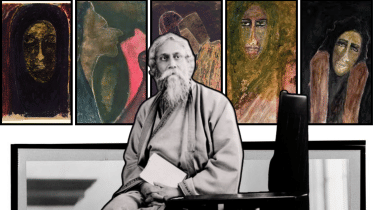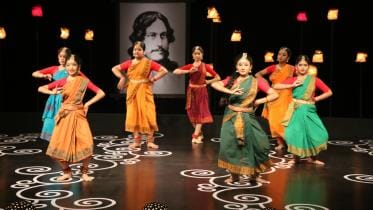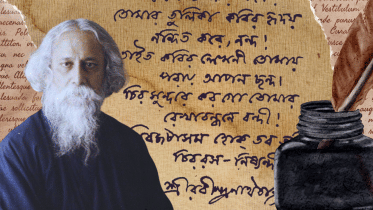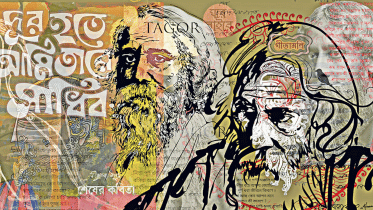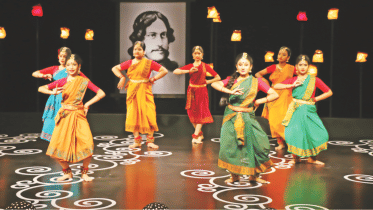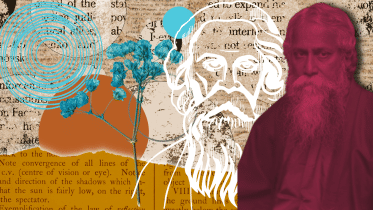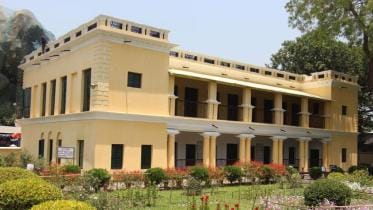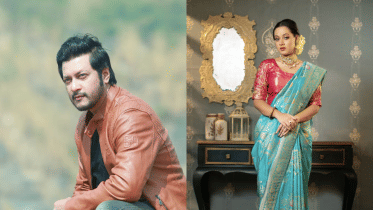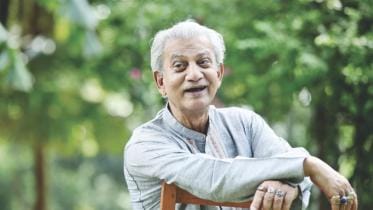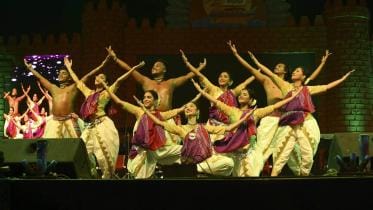Rabindranath Tagore
A journey through Tagore’s evolving soul at Bengal Shilpalay
From youthful longing to philosophical maturity, Rabindranath Tagore’s creative life unfolded as a continuous journey rather than something stagnant. That journey took centre stage at “Jatrapather Anandagan”, a thoughtfully curated cultural programme held on Friday (January 30) evening at Bengal Shilpalay in Dhanmondi.
1 February 2026, 13:11 PM
Int’l co-production: Chanchal–Pori Moni starrer ‘Shasti’ backed by four producers
Rabindranath Tagore’s celebrated short story “Shasti”, previously adapted for the screen by Chashi Nazrul Islam in 2004, is set to return in a new cinematic form—this time reimagined for a contemporary audience.
20 January 2026, 11:27 AM
Pori Moni, Chanchal Chowdhury to star in modern retelling of Tagore’s ‘Shasti’
Pori Moni and Chanchal Chowdhury are set to collaborate for the first time in a film inspired by Rabindranath Tagore’s short story “Shasti”.
19 January 2026, 11:01 AM
‘Aloker Ei Jhorna-Dharay’ pays luminous tribute to Rabindranath Tagore
Last evening, that engagement unfolded with both reverence and vitality at “Aloker Ei Jhorna-Dharay” (The Eternal Illumination), a collaborative tribute by the Embassy of Sweden in Dhaka and HSBC Bangladesh.
2 December 2025, 11:49 AM
In devotion to Tagore: The musical journey of Chanchal Khan
There is a kind of music that does not seek the spotlight — and Chanchal Khan belongs to that rare lineage of artists for whom art itself is an act of devotion. A singer, filmmaker, and interpreter of Rabindra Sangeet, his journey from Chhayanaut in 1970s Dhaka to stages across continents reflects a life devoted to music, words, and the timeless philosophy of Rabindranath Tagore.
2 November 2025, 06:39 AM
Bibarton’s child artistes stage Tagore’s ‘Rother Roshi’
The Dhaka unit of theatre troupe Bibarton Jessore’s children’s wing brought Rabindranath Tagore’s classic play “Rother Roshi” to the stage last evening, marking their second theatre production.
23 August 2025, 06:48 AM
“Ghonoghota” unites all ages through monsoon dance
"Ghonoghota," a monsoon-themed dance production by the Arthy Ahmed Dance Academy, featured adult beginners from diverse backgrounds, performing Rabindranath Tagore’s works. The event celebrated participation over perfection, highlighting the joy of starting anew at any age.
9 August 2025, 11:09 AM
Honouring Rabindranath Tagore: 84 years of enduring legacy
Tagore was not simply a literary genius who gifted Bengali literature its modern form. He was an architect of consciousness. The first non-European Nobel laureate in literature, he brought Bengali language and thought into global conversation with “Gitanjali” in 1913. His creative output—across poetry, fiction, music, theatre, education, and political thought—was vast, but always anchored in a core idea: that art must be in service of the human spirit.
6 August 2025, 06:31 AM
Rabindranath Tagore’s paintings fell victim to Nazi purge of ‘degenerate art’
In 1930, Tagore gifted five of his artworks—vibrant paintings of birds, humans, and a girl in a red robe—to a leading Berlin museum. The collection was part of a larger European exhibition showcasing over 300 of his works, which also travelled to Paris and London. Tagore’s art, like his writings, was gaining admiration; he had visited Germany three times, his books were widely translated, and the German press hailed him as a “wise man from the East.”
6 August 2025, 06:17 AM
TV channels to observe Tagore’s death anniversary with special programmes
Today marks the 84th death anniversary of Rabindranath Tagore, who passed away, leaving behind a timeless literary legacy. To commemorate his iconic contributions to literature, art, and music, several television channels have arranged special programming to honour the poet on this solemn day.
6 August 2025, 03:00 AM
Philosophical fraternity of Rabindranath Tagore and Anwar Ibrahim
In a lecture, Rabindranath proclaimed, “I hope that some dreamer will spring from among you and preach a message of love and therewith, overcoming all differences..."
10 May 2025, 05:42 AM
How a Tagore song became my eternal lullaby
A Tagore lullaby triggers a vivid childhood memory of a monsoon boat ride, exploring how soft, emotional songs — beyond traditional lullabies — soothe sleep through rhythm, parental love, and deep, subconscious emotional conditioning.
8 May 2025, 10:35 AM
A legacy of Tagore songs in Bengali and Hindi films
Today, on 25th Boishakh, the 164th birth anniversary of Nobel laureate Rabindranath Tagore, the legacy of his music continues to echo far and wide- not just in the hearts of Bengalis, but across the cinematic landscapes of both Bengal and Bollywood. While his poetry and songs remain an inseparable part of everyday life, Rabindra Sangeet has also found a cherished place in both Bengali and Hindi cinema, often adapted, referenced, or directly used to elevate cinematic storytelling.
8 May 2025, 10:06 AM
You have made me endless...
Thank you, Gurudev, for making the finite journey of my life an infinite experience!
8 May 2025, 09:05 AM
Tagore’s birth anniversary specials airing on TV
Television channels across the nation are offering a rich array of special programming to honor his literary legacy
8 May 2025, 05:23 AM
Rabindranath, protest, and contested legacies
Anyone familiar with Bangladesh and its culture knows how important his poems and songs are in celebrating our heritage.
8 May 2025, 03:00 AM
Echoes of Tagore: A celebration of his legacy at Shahzadpur
The Shahzadpur Kacharibari, a mansion within Rabindranath Tagore's ancestral estate in Sirajganj, continues to preserve the legacy of the Nobel Laureate poet
7 May 2025, 14:54 PM
Emon and Dighi to debut as a pair in ‘Denapaona’ adaptation
Adapted from Rabindranath Tagore’s classic short story, “Denapaona” marks Emon’s feature film after a good while. Dighi was confirmed as the lead character, Nirupama, at the start of the year. Emon officially joined the cast this week and announced that filming is scheduled to begin next month.
20 April 2025, 10:22 AM
Prabir Mitra hospitalised as health deteriorates
Veteran actor Prabir Mitra has been hospitalised due to severe health issues. Facing complications from oxygen deficiency and other ailments, he was admitted to a private medical facility in the capital on December 22. His younger son, Sifat Islam, confirmed the news to the daily Prothom Alo.
4 January 2025, 11:41 AM
Bangladeshi dance troupe turns heads at Indian festival
In a lively celebration of cultural exchange, a distinguished nine-member ensemble from Dhaka’s esteemed dance academy, “Kolpotoru,” showcased Bangladesh’s artistic heritage at the illustrious “Bali Yatra Festival 2024” in India. The performance was held at the invitation of the Government of India.
23 November 2024, 04:56 AM



